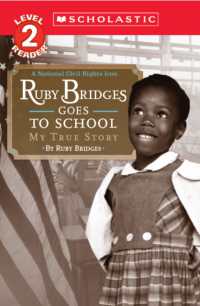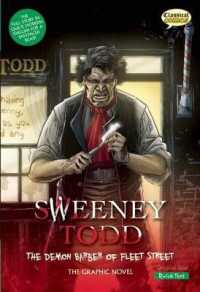- ホーム
- > 洋書
- > 英文書
- > Business / Economics
Full Description
This book investigates how education and participation shape musical identity across the amateur-professional spectrum, reframing amateurism as a space of passion, dedication, and authenticity rather than deficiency. It treats the amateur-professional divide as a social construct—made in pedagogy and institutions—then shows how teaching and learning can unsettle that divide in practice.
Once celebrated for their intrinsic love of music, amateurs today are often dismissed as lacking skill or seriousness. This edited collection challenges that narrative by foregrounding the unique value of amateur music-making and by demonstrating why many of the same pedagogies that empower amateurs also strengthen professional practice. Through diverse case studies and theoretical perspectives, it highlights the formative experiences, pedagogical practices, and community contexts that shape musicians' journeys. Across the chapters, the volume shows what musicians are taught, how they are taught, and the dynamics that support their development in settings from secondary schools and examination systems to studio teaching and community ensembles. Topics such as motivation, repertoire, and leadership appear alongside broader themes like the amateur-professional divide and the social role of music. Vocal music and choral settings—often central to amateur music-making—receive special focus in the later chapters.
This book is intended for scholars and advanced students in music education, pedagogy, sociology, and cultural studies. It will also resonate with music teachers, conductors, and arts policymakers interested in supporting inclusive and meaningful musical engagement. While many chapters centre on Aotearoa New Zealand, the themes and insights hold international relevance for contexts where amateur music-making thrives—across Europe, North America, East Asia, and Australia. The volume contributes to underexplored scholarship on amateur musicianship and advocates for a more equitable and expansive view of musical life.
Contents
Introduction: Participatory Music-Making and Dismantling the Amateur-Professional Binary
Imogen Morris and Nancy November
Part 1: Reframing Pedagogy: From Transmission to Relationship
1. Between Performance and Participation: Finding a "Middle Ground" in Studio Pedagogy to Foster "Amateuring" in the Best Sense
Graham McPhail and Nancy November
2. A Letter to the Master: How Can I Help You Teach Me Better?
Te Oti Rakena
Part 2: Institutions that Make (and Can Unmake) the Binary
3. From Elitism to Amateuring? Transitions in the New Zealand Secondary School Music Curriculum
Graham McPhail
4. Graded Music Exams in Aotearoa New Zealand, Part 1: Addressing the Amateur-Professional Binary via Exam Syllabuses
Morag Atchison and Imogen Morris
5. Graded Music Exams in Aotearoa New Zealand, Part 2: Representation in Exam Syllabuses
Morag Atchison and Imogen Morris
Part 3: Communities of Practice and Participatory Musicking
6. Formal and Informal Teaching in the Old-Time and Shape-Note Communities of Practice
Esther M. Morgan-Ellis
7. Community Choirs: Doing It Badly?
Kate Bell
8. Teaching the Disney Canon: Choral Arrangements for Pedagogy and Performance
Gregory Camp








